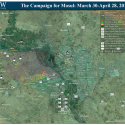 |
 |
The Campaign for Mosul: March 2-April 28

Iraq’s Counter Terrorism Service (CTS) units resumed their advance in western Mosul on April 11 after a 19-day pause. CTS units are advancing along two axes. The northern advance will link up with the 9th Iraqi Army (IA) Armored Division conducting clearing operations northwest of the city. Additional CTS units are encircling the Old City toward the sector’s northern boundary. CTS Commander Abdul Ghani al-Assadi indicated his troops may open a corridor north of the Old City in hopes that ISIS militants will flee the Old City rather than fight in the dense complex. The U.N estimates as many as 400,000 civilians are trapped within the Old City. ISIS has intentionally drawn U.S.-led Coalition airstrikes on structures within the Old City where it has forced civilians to congregate. ISIS will continue this strategy, as it successfully stirred up political blowback. ISIS also conducted small-scale chemical weapons attacks on ISF in the Old City, though with minimal impact according to ISF and U.S. Department of Defense sources. ISIS will likely allocate its greatest defenses to al-Nuri Mosque, where ISIS leader Abu Bakr al-Baghdadi appeared publically in 2014.
Turkey’s escalation of attacks on U.S. partner forces in northern Syria and northwest Iraq threaten anti-ISIS operations. Turkish President Recep Tayyip Erdogan stated he would launch a new, Iraq phase of operation in Syria, Operation Euphrates Shield on April 4. The Turkish Air Force conducted airstrikes on positions held by Kurdistan Workers’ Party (PKK) affiliates near Sinjar in addition to Hasaka Province, eastern Syria on April 25. The Turkish airstrikes also hit a Kurdistan Democratic Party (KDP) base near Sinjar, likely unintentionally. Turkey also pressured Iraq’s Prime Minister Haidar al-Abadi to redirect Iranian-backed Popular Mobilization Units (PMU) from Tel Afar, a primarily Turkmen town west of Mosul by threatening action should the PMU seize Tel Afar. PM Abadi cut a deal with PMU elements to divert efforts from Tel Afar to villages southwest of Sinjar, near the Iraq-Syria border. PM Abadi’s decision reduced the threat of a Turkish-Iranian contest over Tel Afar that could have threatened the final phase of the Mosul operation. Turkish incursions in northern Iraq strain relations between Baghdad and the Kurdistan Regional Government and also detract from the Mosul campaign’s final phase.